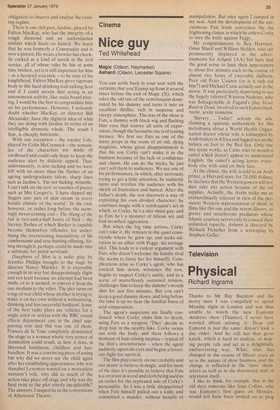Cinema
Nice guy
Ted Whitehead
Magic (Odeon, Haymarket) Ashanti (Odeon, Leicester Square) You can settle back in your seat with the certainty that you'll jump up from it several times before the end of Magic (X), which takes the old tale of the ventriloquist dominated by his dummy and turns it into an excellent thriller, rich in suspense and creepy atmosphere. The star of the show is Fats, a dummy with black wig and flashing blue eyes that convey all sorts of expressions, though the favourite one is of teasing menace. We first see Fats as one of the many props in the room of an old, dying magician, whose great disappointment is that his son Corky can't make it in the business because of his lack of confidence and charm. He can do the tricks, he just can't sell them to audiences. We see one of his performances, in which, after nervously trying to get a little attention, he suddenly turns and terrifies the audience with his shriek of frustration and hatred. After the father's death, the son discovers a way of exploiting his own divided character: he combines magic with a vetriloquist's act in which, as Corky, he's a nice timid guy, and as Fats he's a monster of bilious wit and foul-mouthed aggression.
But when the big time arrives, Corky can't take it. He retreats to the quiet countryside where he grew up, and seeks salvation in an affair with Peggy, his teenage idol. This leads to a violent argument with Fats, who doesn't welcome the female rival (he seems to fancy her for himself). Complications arise as Corky's agent, who has tracked him down, witnesses the row, begins to suspect Corky's sanity, and in a scene of marvellously sustained tension, challenges him to keep the dummy's mouth shut for just five minutes. But you can't keep a good dummy down, and long before the time is up we hear the familiar burst of acid vituperation.
The agent's suspicions are finally confirmed when Corky clubs him to death, using Fats as a weapon. 'They' decide to drop him in the nearby lake. Corky swims out with the body, and there follows a moment of hair-raising surprise — typical of the film's inventiveness — when the agent suddenly opens his eyes and begins a ferocious fight for survival.
The film plays nicely on our credulity and our desire to believe in magic, and for most of the time it's possible to believe that Fats is a creation in wood and cloth being used as an outlet for the repressed side of Corky's personality. So I was a little disappointed when Fats himself pulled out a knife and committed a murder, without benefit of manipulation. But once again I jumped in my seat. And the development of the autonomous Fats lends conviction the the frightening climax in which he orders Corky to turn the knife against Peggy.
My congratulations to Rex Harrison, Omar Sharif and William Holden, who are prominently displayed in the advertisements for Ashanti (AA) but have had the good sense to limit their appearances to about five minutes each in the course of almost two hours of execrable dullness. Poor old Peter Ustinov (or is it rich old him?) and Michael Caine actually star in the movie. It was particularly depressing to see the hugely talented Winston Ntshona, who was onforgettable in Fugard's play Sizwe Bansi is Dead, involved in such hypocritical. racist, sexist nonsense.
'Slavery . . . Today!' scream the ads, claiming a spurious authenticity for this melodrama about a World Health Organisation doctor whose wife is kidnapped by Arab traders in Africa and lugged across the Sahara on foot to the Red Sea. Only one tiny scene works, as Caine tries to mount a camel which doesn't appear to understand English; the camel's acting leaves everybody else with sand on their face.
At the climax, the wife is sold to an Arab prince, a Harvard man, for 20,000 dollars; he declares that the Western powers will not dare take any action because of the oil supplies. Actually, the Arabs strike me as extraordinarily tolerant in view of the persistent Western representation of them, in films like this one and the recent Slavers, as greasy and treacherous predators whose Islamic courtesy serves only to conceal their unlimited rapacity. Ashanti is directed by Richard Fleischer from a screenplay by Stephen Geller.






































 Previous page
Previous page